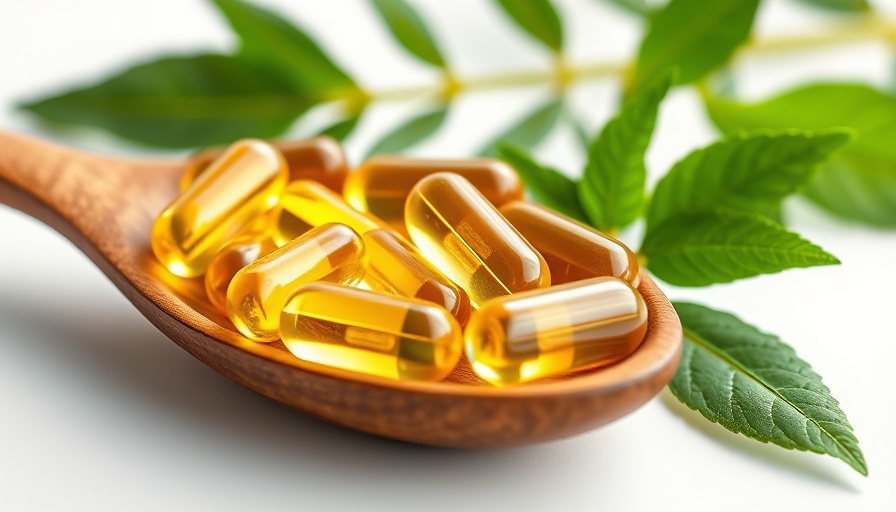
Understanding the Power of Vitamin E in Your Diet
Vitamin E is not just another nutrient; it is a powerful antioxidant that plays a crucial role in keeping your body healthy. By protecting our cells from damage caused by free radicals, Vitamin E supports overall well-being. In our fast-paced environment, where exposure to environmental toxins and stressors affects our health, maintaining optimal levels of this nutrient is more important than ever.
Why You Should Focus on Foods Rich in Vitamin E
Incorporating Vitamin E-rich foods into your diet offers numerous health benefits. This vitamin enhances immune function, aids skin health, and plays a role in cognitive function. For adults, especially seniors, it can be vital in fortifying an immune system that may not be as robust as it once was. Furthermore, Vitamin E aids in skin repair and can protect against damage from UV rays, making it a popular ingredient in skincare products.
The Recommended Daily Intake: What You Should Know
The National Institutes of Health (NIH) advises adults to aim for about 15 mg of alpha-tocopherol, the most recognized form of Vitamin E. Pregnant or breastfeeding women require higher amounts, and it's best to consult with healthcare providers to tailor needs. Achieving this intake naturally through food is ideal, as whole foods contain beneficial compounds working synergistically.
Top Delicious Foods Packed with Vitamin E
Enhancing your meals with Vitamin E can be both enjoyable and rewarding. Here’s a look at ten delectable foods that not only taste great but will help you meet your daily nutritional goals:
Almonds: Often revered as a superfood, just one ounce of almonds contains approximately 7.3 mg of Vitamin E. These nutrient-dense nuts are great for heart health and make for a filling snack.
Hazelnuts: With about 4.3 mg of Vitamin E per ounce, hazelnuts are not only tasty but also provide significant heart-healthy benefits.
Pine Nuts: A unique option, pine nuts offer roughly 2.7 mg of Vitamin E per ounce, making them a delightful addition to salads and pestos.
Spinach: Packed with nutrients, one cup of cooked spinach can give you nearly 20% of your daily Vitamin E requirement.
Avocado: This creamy fruit provides about 2.1 mg of Vitamin E per fruit. It’s versatile for spreads or salad toppings.
Sunflower Seeds: A fantastic snack option, just one ounce can hold about 7.4 mg of Vitamin E, making them a crunchy delight loaded with health benefits.
Wheat Germ: This powerhouse can yield approximately 15 mg of Vitamin E in just a single ounce. Try incorporating it into smoothies or yogurt.
Mango: A deliciously sweet fruit, one whole mango offers around 5 mg of Vitamin E, providing both hydration and nutrition.
Kiwifruit: This fuzzy fruit contains about 1 mg of Vitamin E per fruit, along with a range of other nutrients.
Bell Peppers: Whether red, yellow, or green, just one cup of raw bell peppers can provide about 2.5 mg of Vitamin E, adding both color and flavor to your meals.
Creative Ways to Incorporate Vitamin E into Your Meals
To boost your Vitamin E intake, think about creative meal combinations. Start your day with a smoothie packed with spinach, mango, and almond milk. Consider trying a refreshing salad with avocado, bell peppers, and sunflower seeds for lunch. For dinner, incorporate nuts or oils rich in Vitamin E into your cooking for enhanced flavor and health benefits.
Final Thoughts: Why This Matters
By understanding the importance of Vitamin E and finding delicious ways to incorporate it into your meals, you can enhance your health significantly. As we strive for overall wellness, these nutrient-rich foods can play a pivotal role. Remember, focusing on nutrition is a fundamental part of self-care and wellness.
Take Action for Your Health Today!
Start today by adding Vitamin E-rich foods to your grocery list. Explore new recipes and commit to a healthier, more vibrant lifestyle.
 Add Row
Add Row  Add
Add 




Write A Comment